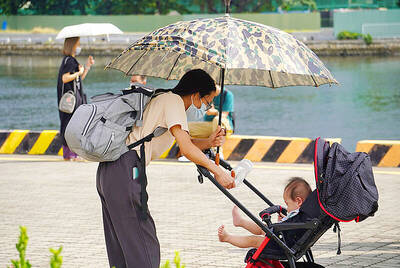Following the first anniversary of the Tokaimura nuclear accident in Japan on Sept. 30, Japanese anti-nuclear activists accompanied by Taiwanese legislators highlighted the dangers of nuclear plants yesterday in Taipei by releasing updated information on the accident.
Speaking through a translator Theodore Kay (
"The Japanese people were told that the probability of such an accident was pretty low, but it still happened," said Ban, adding that it had caused two deaths in the past year and left 310,000 residents within 10km of the reprocessing plant living with nuclear fallout.
Ban said that the residents had organized an association to seek compensation from the Japanese government by following a precedent set in the aftermath of the atomic bombs that devastated Hiroshima and Nagasaki at the end of World War II.
New Party legislator Josephine Chu (
KMT legislator Jao Yung-ching (
Since this type of reactor has already been the source of problems in Japan, Jao argued, Premier Tang should consider alternatives, including renewable sources of energy, such as solar energy and wind power.
In the book published by the CNIC, Criticality Accident at Tokaimura: 1mg of uranium that shattered Japan's nuclear myth, CNIC activists reveal the hidden dangers of nuclear plants, which they claim are seldom addressed by government agencies and suppliers of nuclear power.
"Criticality," according to the report, occurs when "a nuclear chain reaction becomes self-sustaining."
The accident at the reprocessing plant operated by the JCO Co in central Japan on Sept. 30, 1999, is now regarded as Japan's worst nuclear accident and the world's worst since Chernobyl in 1986.
"The potential dangers could be far more serious because about three million times the amount of uranium that caused last year's accident is still being processed at the plant," said Ban.
Ban also said that he was "astonished" by what he observed at nuclear power plants in Taiwan because "safety was simply ignored."
"At the Second Nuclear Power Plant (
Ban said that nuclear waste could be very dangerous and that a serious fire occurred at Tokaimura in 1997 when workers mixed nuclear waste with asphalt.
Pan Han-chiang (
"The nuclear industry in Japan could be revived by this purchase. Further exports will increase nuclear risks in other countries," said Pan.
Pan said that Japanese activists had expressed their concern over exports by their nuclear industry because they could "become the source of another atrocity similar to those committed by the Japanese during World War II."

DEFENDING DEMOCRACY: Taiwan shares the same values as those that fought in WWII, and nations must unite to halt the expansion of a new authoritarian bloc, Lai said The government yesterday held a commemoration ceremony for Victory in Europe (V-E) Day, joining the rest of the world for the first time to mark the anniversary of the end of World War II in Europe. Taiwan honoring V-E Day signifies “our growing connections with the international community,” President William Lai (賴清德) said at a reception in Taipei on the 80th anniversary of V-E Day. One of the major lessons of World War II is that “authoritarianism and aggression lead only to slaughter, tragedy and greater inequality,” Lai said. Even more importantly, the war also taught people that “those who cherish peace cannot

Taiwanese Olympic badminton men’s doubles gold medalist Wang Chi-lin (王齊麟) and his new partner, Chiu Hsiang-chieh (邱相榤), clinched the men’s doubles title at the Yonex Taipei Open yesterday, becoming the second Taiwanese team to win a title in the tournament. Ranked 19th in the world, the Taiwanese duo defeated Kang Min-hyuk and Ki Dong-ju of South Korea 21-18, 21-15 in a pulsating 43-minute final to clinch their first doubles title after teaming up last year. Wang, the men’s doubles gold medalist at the 2020 and 2024 Olympics, partnered with Chiu in August last year after the retirement of his teammate Lee Yang

The Philippines yesterday criticized a “high-risk” maneuver by a Chinese vessel near the disputed Scarborough Shoal (Huangyan Island, 黃岩島) in a rare incident involving warships from the two navies. The Scarborough Shoal — a triangular chain of reefs and rocks in the contested South China Sea — has been a flash point between the countries since China seized it from the Philippines in 2012. Taiwan also claims the shoal. Monday’s encounter took place approximately 11.8 nautical miles (22km) southeast” of the Scarborough Shoal, the Philippine military said, during ongoing US-Philippine military exercises that Beijing has criticized as destabilizing. “The Chinese frigate BN 554 was

The number of births in Taiwan fell to an all-time monthly low last month, while the population declined for the 16th consecutive month, Ministry of the Interior data released on Friday showed. The number of newborns totaled 8,684, which is 704 births fewer than in March and the lowest monthly figure on record, the ministry said. That is equivalent to roughly one baby born every five minutes and an annual crude birthrate of 4.52 per 1,000 people, the ministry added. Meanwhile, 17,205 deaths were recorded, resulting in a natural population decrease of 8,521, the data showed. More people are also leaving Taiwan, with net